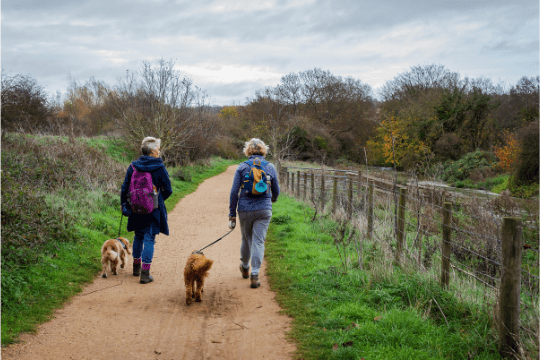
Exercise and Ageing - Part 2
If you’ve read Part 1 of “Exercise and Ageing”, I hope you found (and tried) a few simple hacks to up your activity levels without too much disruption to your daily life.
In this follow-up, I want to continue looking at the benefits of walking, focussing in particular on getting outdoors and into nature.
What’s in a walk?
Walking should be the most natural thing in the world to us homo sapiens… after all, as hunter-gatherers we would have walked miles in order to eat! But that need to go out and hunt down or forage for our next meal has all but disappeared. Fully stocked out-of-town supermarkets and food delivered on demand have replaced even the shortest walk to the shops, often taking with it our innate instinct or need to move.
So, what’s going to stimulate us to get up and walk if lost habits (and the British weather) stand in the way?
There is a host of evidence about the benefits of walking. How it improves blood flow to the brain, boosting memory and making you mentally sharper. Its impact on energy levels, improving sleep, reducing risk of disease and generally rebooting overall wellbeing.
‘Yeah, yeah, we know this already. Tell us something new’
I hear you…We’ve all heard that walking is good! But maybe you need a different sort of motivation to get moving more?
Are you in or out?
We can rest easy knowing that when it comes to activity, a little more can mean a lot. We know that walking is good for our health, so let’s look at how we can hit our wellbeing with a double dose of goodness……getting into the great outdoors.
The mental health charity Mind suggests that “Spending time in green space or bringing nature into your everyday life can benefit both your mental and physical wellbeing”. Covid 19 and our new ways of working taught us the healthy importance of getting outside, having a change of scenery, breathing fresh air, engaging with other people (even it’s just a passing “hello”).
The good news is, getting outside and into nature doesn’t have to involve a big effort. It doesn’t matter where you live, it’s not all mountain hikes, compasses, backpacks, or even sturdy footwear!
Simply being outside can help reduce levels of the “stress” hormone cortisol. If you’re feeling stressed, anxious or just a bit fed up, step outside and take a deep breath….how good does that feel? If you live in a town or city, find the nearest park or green space that you can walk to. There are any number of urban initiatives dedicated to cleaning up or developing inner city green spaces and they’re always looking for volunteers. Want to keep your neighbourhood looking great? What about joining a collective litter-picking walk? Knowing you’re doing good for yourself and giving back will definitely make you feel better.
What’s trundl got to do with it?
trundl’s purpose is to encourage people to get out and walk regularly and turn their collective activities into charity donations. So when a good friend asked me to become a tester for the brand new trundl app, of course I couldn’t say no.
In the knowledge that my activity was not only helping to develop a brilliant app, but also aiding some great UK charities, I’ve been out and about trundling all over the place. Even on a simple walk round the village or into town to shop, I press ‘start’ on the app and I’m trundling. It’s great to feel that every step I clock on the app not only boosts my wellbeing, it helps some really great UK causes! AND you get rewarded for your efforts in other ways too!
“In every walk with nature, one receives far more than he seeks” John Muir (Scottish-born naturalist)
Intrigued to see if being part of this virtual charity walking collective had motivated or influenced their behaviour, I recently spoke to some other trundl testers:
Before I became a trundl tester, I walked every day with the dogs. I still go out as usual, but now I always think I’ll go a bit further if I’ve got time, as it will help the charity. Being part of a “collective”, knowing my effort is helping great causes has definitely changed my thinking about going out – I have to go out because of the dogs but now I feel like I’m doing something good as well!
Lesley R, 40’s and loving it
By getting out 3-4 times on a good week, I probably counted as a reasonable but fair-weather walker before trundl. Helping to test the app has certainly motivated me to walk more, regardless of poor weather conditions though! I definitely feel that being part of a walking community and seeing progress on the app on behalf of good causes has nudged me to get out and walk. I am looking to be even more adventurous with the arrival of some Spring weather!
Max M, 80 and loving it too
I always try to do a decent walk at least once a week (7 or more miles) but now I’m testing the trundl app I feel differently about getting out knowing that charities will benefit from my efforts. It’s not just about the long walks either – I’ve trundled in town on my lunch break and living near the coast I take trundl with me when I head out around my local area knowing that by stepping out I’m also helping out!
Megan C, 30s and a happy trundlr
Take your phone for a stroll not a scroll
trundl’s a great companion to take with you if you’re getting out and about – even if that is just to the shops and back. Because the app can record your activity time, this contributes to the recommended 150 mins of moderate intensity activity we covered in Part 1 of this blog. AND makes you feel good because you’re helping good causes. Win, win, win!!

Ready, Set, Walk!
So, what’s stopping you from getting out and about? Hopefully, this has inspired you enough to yell a resounding “nothing”! Whether it’s walking the dog, going to the local shops, investigating your town or city’s green spaces, or taking on the 3 Peaks Challenge, just putting one foot in front of the other and saying “hello” to the great outdoors with trundl will have a positive impact on your physical and mental health. Don’t worry about how fast or how far you go. Just do it regularly and see how quickly it all adds up to a greater sense of wellbeing.
Say it with me…it’s good to get out!

Debbie Barber is a Personal Trainer based in stunning Weardale who retrained as a Fitness Coach in her late 40s after quitting a stressful corporate job. Being unable to find a PT who understood the challenges of being a menopausal woman nearing her 50s, and dreading the thought of joining a gym, she realised that other women around her local area probably felt the same. Her client base is predominantly women in their 40s to 70s who simply want to feel healthier by being more active.




